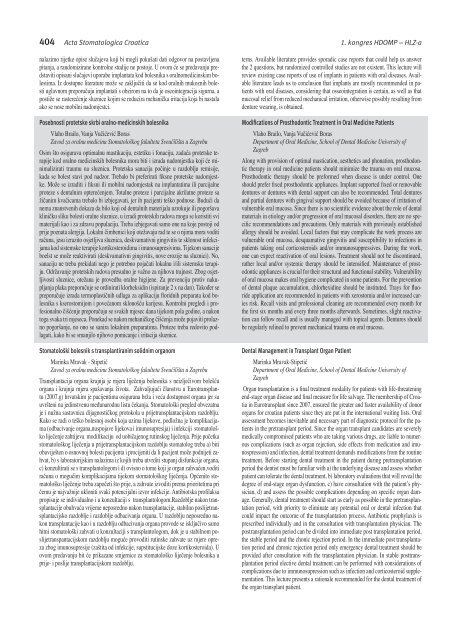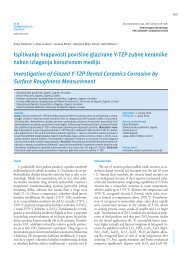ORALNA MEDICINA I PATOLOGIJA USMENA PRIOPĆENJA ORAL ...
ORALNA MEDICINA I PATOLOGIJA USMENA PRIOPĆENJA ORAL ...
ORALNA MEDICINA I PATOLOGIJA USMENA PRIOPĆENJA ORAL ...
You also want an ePaper? Increase the reach of your titles
YUMPU automatically turns print PDFs into web optimized ePapers that Google loves.
404 Acta Stomatologica Croatica<br />
nalazimo rijetke opise slučajeva koji bi mogli pokušati dati odgovor na postavljena<br />
pitanja, a randomizirane kontrolne studije ne postoje. U ovom će se predavanju predstaviti<br />
opisani slučajevi uporabe implantata kod bolesnika s oralnomedicinskim bolestima.<br />
Iz dostupne literature može se zaključiti da se kod oralnih mukoznih bolesti<br />
uglavnom preporučuju implantati s obzirom na to da je oseointegracija sigurna, a<br />
postiže se rasterećenje sluznice kojim se reducira mehanička iritacija koja bi nastala<br />
ako se nose mobilni nadomjestci.<br />
Posebnosti protetske skrbi oralno-medicinskih bolesnika<br />
Vlaho Brailo, Vanja Vučićević Boras<br />
Zavod za oralnu medicinu Stomatološkog fakulteta Sveučilišta u Zagrebu<br />
Osim što osigurava optimalnu mastikaciju, estetiku i fonaciju, zadaća protetske terapije<br />
kod oralno medicinskih bolesnika mora biti i izrada nadomjestka koji će minimalizirati<br />
traumu na sluznicu. Protetska sanacija počinje u razdoblju remisije,<br />
kada se bolest stavi pod nadzor. Trebalo bi preferirati fiksne protetske nadomjestke.<br />
Može se izraditi i fiksni ili mobilni nadomjestak na implantatima ili parcijalne<br />
proteze s dentalnim opterećenjem. Totalne proteze i parcijalne akrilatne proteze sa<br />
žičanim kvačicama trebalo bi izbjegavati, jer ih pacijenti teško podnose. Budući da<br />
nema znanstvenih dokaza da bilo koji od dentalnih materijala uzrokuje ili pogoršava<br />
kliničku sliku bolesti oralne sluznice, u izradi protetskih radova mogu se koristiti svi<br />
materijali kao i za zdravu populaciju. Treba izbjegavati samo one na koje postoji od<br />
prije poznata alergija. Lokalni čimbenici koji otežavaju rad te se o njima mora voditi<br />
računa, jesu izrazito osjetljiva sluznica, deskvamativni gingivitis te sklonost infekcijama<br />
kod sistemske terapije kortikosteroidima i imunosupresivima. Tijekom sanacije<br />
boelst se može reaktivirati (deskvamativni gingivitis, nove erozije na sluznici). No,<br />
sanaciju ne treba prekidati nego je potrebno pojačati lokalnu i/ili sistemsku terapiju.<br />
Održavanje protetskih radova presudno je važno za njihovu trajnost. Zbog osjetljivosti<br />
sluznice, otežana je provedba oralne higijene. Za prevenciju protiv nakupljanja<br />
plaka preporučuje se ordinirati klorheksidin (ispiranje 2 x na dan). Također se<br />
preporučuje izrada termoplastičnih udlaga za aplikaciju floridnih preparata kod bolesnika<br />
s kserostomijom i povećanom sklonošću karijesu. Kontrolni pregledi i profesionalno<br />
čišćenje preporučuju se svakih mjesec dana tijekom pola godine, a nakon<br />
toga svaka tri mjeseca. Ponekad se nakon mehaničkog čišćenja može pojaviti prolazno<br />
pogoršanje, no ono se sanira lokalnim preparatima. Proteze treba redovito podlagati,<br />
kako bi se smanjilo njihovo pomicanje i iritacija sluznice.<br />
Stomatološki bolesnik s transplantiranim solidnim organom<br />
Marinka Mravak - Stipetić<br />
Zavod za oralnu medicinu Stomatološkog fakulteta Sveučilišta u Zagrebu<br />
Transplantacija organa krajnja je mjera liječenja bolesnika s neizlječivom bolešću<br />
organa i krajnja mjera spašavanja života. Zahvaljujući članstvu u Eurotransplantu<br />
(2007.g) hrvatskim je pacijentima osigurana brža i veća dostupnost organa jer su<br />
uvršteni na jedinstvenu međunarodnu listu čekanja. Stomatološki pregled obvezatna<br />
je i nužna sastavnica dijagnostičkog protokola u prijetransplantacijskom razdoblju.<br />
Kako se radi o teško bolesnoj osobi koja uzima lijekove, podložna je komplikacijama<br />
(odbacivanje organa,nuspojave lijekova i imunosupresija) i infekciji stomatološko<br />
liječenje zahtijeva modifikaciju od uobičajenog rutinskog liječenja. Prije početka<br />
stomatološkog liječenja u prijetransplantacijskom razdoblju stomatolog treba a) biti<br />
obaviješten o osnovnoj bolesti pacijenta i procijeniti da li pacijent može podnijeti zahvat,<br />
b) s laboratorijskim nalazima iz kojih treba utvrditi stupanj disfunkcije organa,<br />
c) konzultirati se s transplantologom i d) ovisno o tome koji je organ zahvaćen,voditi<br />
računa o mogućim komplikacijama tijekom stomatološkog liječenja. Općenito stomatološko<br />
liječenje treba započeti što prije, a zahvate izvoditi prema prioritetima pri<br />
čemu je najvažnije ukloniti svaki potencijalni izvor infekcije. Antibiotska profilaksa<br />
propisuje se individualno i u konzultaciji s transplantologom.Razdoblje nakon transplantacije<br />
obuhvaća vrijeme neposredno nakon transplantacije, stabilno poslijetransplantacijsko<br />
razdoblje i razdoblje odbacivanja organa. U razdoblju neposredno nakon<br />
transplantacije kao i u razdoblju odbacivanja organa provode se isključivo samo<br />
hitni stomatološki zahvati u konzultaciji s transplantologom, dok je u stabilnom poslijetranspantacijskom<br />
razdoblju moguće provoditi rutinske zahvate uz mjere opreza<br />
zbog imunosupresije (zaštita od infekcije, supstitucijske doze kortikosteroida). U<br />
ovom predavanju bit će prikazane smjernice za stomatološko liječenje bolesnika u<br />
prije- i poslije transplantacijskom razdoblju.<br />
1. kongres HDOMP – HLZ-a<br />
terns. Available literature provides sporadic case reports that could help us answer<br />
the 2 questions, but randomized controlled studies are not existent. This lecture will<br />
review existing case reports of use of implants in patients with oral diseases. Available<br />
literature leads us to conclusion that implants are mostly recommended in patients<br />
with oral diseases, considering that osseointegration is certain, as well as that<br />
mucosal relief from reduced mechanical irritation, otherwise possibly resulting from<br />
denture wearing, is obtained.<br />
Modifications of Prosthodontic Treatment in Oral Medicine Patients<br />
Vlaho Brailo, Vanja Vučićević Boras<br />
Department of Oral Medicine, School of Dental Medicine University of<br />
Zagreb<br />
Along with provision of optimal mastication, aesthetics and phonation, prosthodontic<br />
therapy in oral medicine patients should minimize the trauma on oral mucosa.<br />
Prosthodontic therapy should be preformed when disease is under control. One<br />
should prefer fixed prosthodontic appliances. Implant supported fixed or removable<br />
dentures or dentures with dental support can also be recommended. Total dentures<br />
and partial dentures with gingival support should be avoided because of irritation of<br />
vulnerable oral mucosa. Since there is no scientific evidence about the role of dental<br />
materials in etiology and/or progression of oral mucosal disorders, there are no specific<br />
recommendations and precautions. Only materials with previously established<br />
allergy should be avoided. Local factors that may complicate the work process are<br />
vulnerable oral mucosa, desquamative gingivitis and susceptibility to infections in<br />
patients taking oral corticosteroids and/or immunosuppressives. During the work,<br />
one can expect reactivation of oral lesions. Treatment should not be discontinued,<br />
rather local and/or systemic therapy should be intensified. Maintenance of prostodontic<br />
appliances is crucial for their structural and functional stability. Vulnerability<br />
of oral mucosa makes oral hygiene complicated in some patients. For the prevention<br />
of dental plaque accumulation, chlorhexidine should be instituted. Trays for fluoride<br />
application are recommended in patients with xerostomia and/or increased caries<br />
risk. Recall visits and professional cleaning are recommended every month for<br />
the first six months and every three months afterwards. Sometimes, slight reactivation<br />
can follow recall and is usually managed with topical agents. Dentures should<br />
be regularly relined to prevent mechanical trauma on oral mucosa.<br />
Dental Management in Transplant Organ Patient<br />
Marinka Mravak-Stipetić<br />
Department of Oral Medicine, School of Dental Medicine University of<br />
Zagreb<br />
Organ transplantation is a final treatment modality for patients with life-threatening<br />
end-stage organ disease and final measure for life salvage. The membership of Croatia<br />
in Eurotransplant since 2007, ensured the greater and faster availability of donor<br />
organs for croatian patients since they are put in the international waiting lists. Oral<br />
assessment becomes inevitable and necessary part of diagnostic protocol for the patients<br />
in the pretransplant period. Since the organ transplant candidates are severely<br />
medically compromised patients who are taking various drugs, are liable to numerous<br />
complications (such as organ rejection, side effects from medication and imunospression)<br />
and infection, dental treatment demands modifications from the routine<br />
treatment. Before starting dental treatment in the patient during pretransplantation<br />
period the dentist must be familiar with a) the underlying disease and assess whether<br />
patient can tolerate the dental treatment, b) laboratory evaluations that will reveal the<br />
degree of end-stage organ dysfunction, c) have consultation with the patient’s physician,<br />
d) and assess the possible complications depending on specific organ damage.<br />
Generally, dental treatment should start as early as possible in the pretransplantation<br />
period, with priority to eliminate any potential oral or dental infection that<br />
could impact the outcome of the transplantation process. Antibiotic prophylaxis is<br />
prescribed individually and in the consultation with transplantation physician. The<br />
postransplantation period can be divided into immediate post transplantation period,<br />
the stable period and the chonic rejection period. In the immediate post transplantation<br />
period and chronic rejection period only emergency dental treatment should be<br />
provided after consultation with the transplantation physician. In stable posttransplantation<br />
period elective dental treatment can be performed with considerations of<br />
complications due to immunosupression such as infection and corticosteroid supplementation.<br />
This lecture presents a rationale recommended for the dental treatment of<br />
the organ transplant patient.



